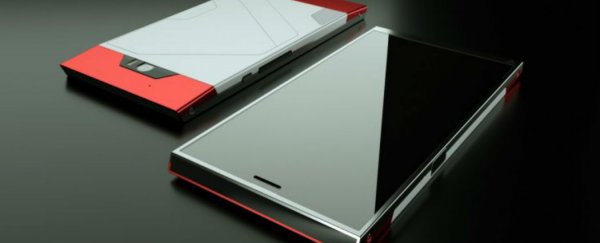Those of you in the market for the very best that smartphone manufacturers can offer will want to take a long look at the new Turing Phone. Its makers are promising groundbreaking levels of security and strength (to protect against both hackers and drops), and it's built from a special liquid metal alloy called liquidmorphium that's stronger than titanium and steel. Pre-orders start at the end of the month.
"Not everyone wants to drive a Volkswagen," Turing Robotic Industries CEO Steve Chao told David Pierce at Wired as he looks to drum up interest in his company's new device. "There are people who like Aston Martins, Lamborghinis, and Ferraris. Right now, most phones are Volkswagens." The implication is that the Turing Phone is the premium choice, though the starting price of US$610 isn't as astronomically expensive as some other high-end models on the market.
It's those materials and security features that make the phone stand out, rather than the price. The handset uses a single, proprietary jack to limit access to the device and the customised version of Android it runs is protected by end-to-end encryption. It even has its own cryptocurrency on board, called Turing coin, and the whole smartphone is protected by a fingerprint-reader on the side.
But back to the liquidmorphium - which Chao says is used in small quantities in the iPhone 6 and may be used more extensively in the iPhone 7 - not only is it ultra-strong, it's more efficient to manufacture, and combines zirconium, copper, aluminium, nickel, and silver. The phone should be able to withstand some serious shocks and bumps, meaning you're less reliant on screen repair specialists in your local area.
Then there's a hydrophobic nano-coating on all the phone's internal components that gives it some impressive waterproofing. The company claims an IPX8 rating, which means it can survive total submersion, and apparently it's been left underwater for 24 hours with no ill effects. The case isn't sealed off - water will actually get inside - but thanks to the nano-coating, you can simply dry off the handset and get back to business.
Perhaps the only slight disappointment are the phone's specifications, with a so-so 2.5GHz quad-core Snapdragon 801 processor and 3GB of RAM keeping everything running. The 5.5-inch, 1920 x 1080 pixel display is also overshadowed by today's flagship devices, so it's that liquid metal casing and those advanced security features that you're really paying for. At least the Android 5.1 software is right up to date, albeit heavily customised.
The phone comes in a choice of three colours and you can choose from 16GB, 64GB or 128GB of storage. Around the back there's a 13-megapixel camera. From the 31 July you can pre-order the phone unlocked, though you might want to wait until a review or two has appeared on the Web first.
"These [security and privacy] features are like the GPS, Wi-Fi, and camera of the early days of smartphones," says Chao. "People were like, 'why do I need that?' But then they were standardised. In the future, if you don't have liquid metal, nano-coating, and a privacy key, you'll be phased out right away."
